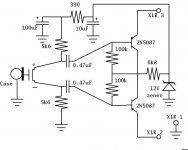Hi folks,
I'm looking for the lowest noise PNP small signal transistor for a microphone circuit wiith a 50 V power supply. I've been searching and a candidate would be the 2N5087, but I wonder if there's something better.
Could anybody suggest a better unit?
Thanks a lot.
Ric
I'm looking for the lowest noise PNP small signal transistor for a microphone circuit wiith a 50 V power supply. I've been searching and a candidate would be the 2N5087, but I wonder if there's something better.
Could anybody suggest a better unit?
Thanks a lot.
Ric
BC550 , you are funny 
Maybe SSM2220?
http://www.analog.com/UploadedFiles/Data_Sheets/196449167SSM2220_b.pdf
Those are SO08 but I have DIL08 for sale
or MAT03
http://www.analog.com/UploadedFiles/Data_Sheets/23265255MAT03_c.pdf

Maybe SSM2220?
http://www.analog.com/UploadedFiles/Data_Sheets/196449167SSM2220_b.pdf
Those are SO08 but I have DIL08 for sale
or MAT03
http://www.analog.com/UploadedFiles/Data_Sheets/23265255MAT03_c.pdf
Circuit
Folks,
Thanks a lot for the suggestions.
I'm attaching the schematic of the "electret mic to balanced phantom power adapter " that I need to build.
Pins labeled XLR 2 and XLR 3 goes to the typical balanced input circuit of a regular mixing board. In that circuit you have 48 V DC applied thru a couple of 6.8K resistors.
So I think the voltage across the transistor (Vce) is way less than 48v. Anyway is nice to have voltage headroom, right?
Ric
Folks,
Thanks a lot for the suggestions.
I'm attaching the schematic of the "electret mic to balanced phantom power adapter " that I need to build.
Pins labeled XLR 2 and XLR 3 goes to the typical balanced input circuit of a regular mixing board. In that circuit you have 48 V DC applied thru a couple of 6.8K resistors.
So I think the voltage across the transistor (Vce) is way less than 48v. Anyway is nice to have voltage headroom, right?
Ric
Attachments
There is another solution - THAT300 4xNPN, THAT320 4xPNP and THAT340 2xNPN. The main problem may be a low amplification coefficient.
http://www.profusionplc.com
http://www.profusionplc.com
Can you change your mind? What do you think about specialised opamp like INA103 or INA163?
Look at Tomasz Brodniewicz's homepage
http://www.proaudio.nwz.pl/konstr_ina103.htm
You can find gif with manufacturer's application
http://www.proaudio.nwz.pl/pre_ina103.gif
author's application
http://www.proaudio.nwz.pl/ina103nowe.gif
PCB
http://www.proaudio.nwz.pl/inaboard.gif
and the last two in EAGLE format.
Application and PCB were done for dynamic micro.
Another link
http://www.mindspring.com/~benbradley/pre.html
Look at Tomasz Brodniewicz's homepage
http://www.proaudio.nwz.pl/konstr_ina103.htm
You can find gif with manufacturer's application
http://www.proaudio.nwz.pl/pre_ina103.gif
author's application
http://www.proaudio.nwz.pl/ina103nowe.gif
PCB
http://www.proaudio.nwz.pl/inaboard.gif
and the last two in EAGLE format.
Application and PCB were done for dynamic micro.
Another link
http://www.mindspring.com/~benbradley/pre.html
the circuit is great, belive me.
Mandat: Thanks for the sugestion. I actually use those ICs and they sound very nice.
But in this case, this circuit posted fits really well for the job. Is a version of a very clever circuit that Schoeps uses in their multi thousend dollars mics. Is minimalistic and does the job. In combination with a preamplifier with clean phantom power, it rocks.
The key is to use low noise transistors. I built it with BC558 and is a non go.
I'll chech the dual one that peranders suggested.
Tks again.
Ric
Mandat: Thanks for the sugestion. I actually use those ICs and they sound very nice.
But in this case, this circuit posted fits really well for the job. Is a version of a very clever circuit that Schoeps uses in their multi thousend dollars mics. Is minimalistic and does the job. In combination with a preamplifier with clean phantom power, it rocks.
The key is to use low noise transistors. I built it with BC558 and is a non go.
I'll chech the dual one that peranders suggested.
Tks again.
Ric
put 2 transistors in parallel and the noise will be something like:Ricren said:Hi folks,
I'm looking for the lowest noise PNP small signal transistor for a microphone circuit wiith a 50 V power supply. I've been searching and a candidate would be the 2N5087, but I wonder if there's something better.
Could anybody suggest a better unit?
Thanks a lot.
Ric
NOISEnew= NOISEinitial *(1/SQRT2)
time for SOT-23, and check out Intersil's surface mount transistor array's -- really nice devices in SO8Ricren said:Good idea (electronicwise) but I can not keep adding parts.. This circuit mus fit in an XLR connector.
But I'll try it anyway
Ric
here's one which looks like it would fit in an XLR shell -- the author is well-published.
http://users.rcn.com/rhcamp/mm2v1p1.pdf
http://users.rcn.com/rhcamp/mm2v1p1.pdf
- Status
- This old topic is closed. If you want to reopen this topic, contact a moderator using the "Report Post" button.
- Home
- Design & Build
- Parts
- low noise transistor needed

 You can use a cascode together with BC550/560
You can use a cascode together with BC550/560